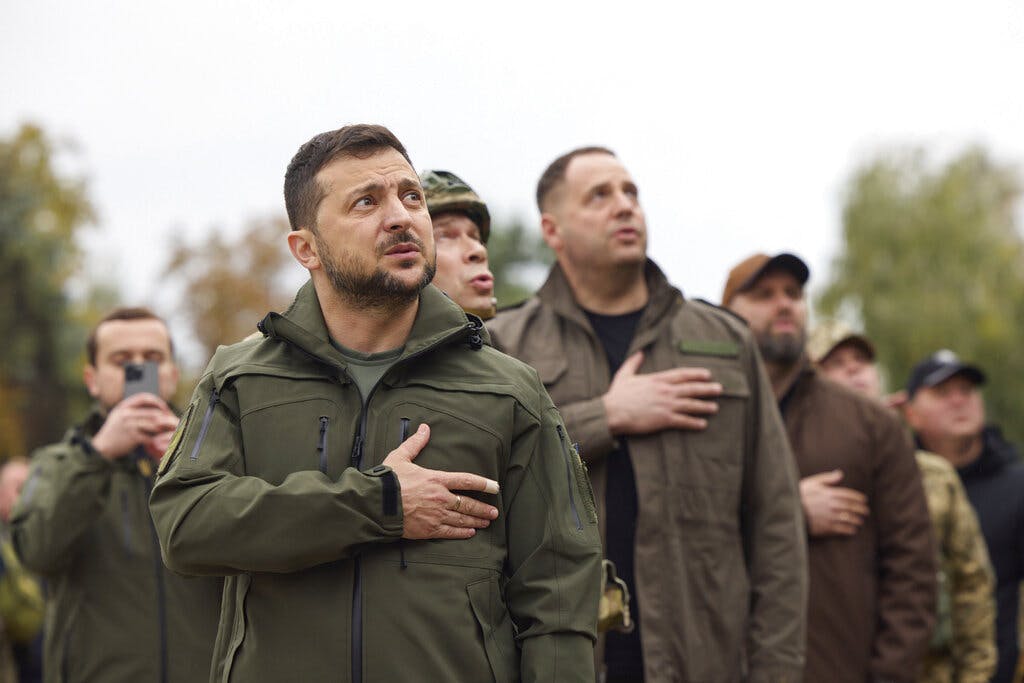Five Things That Could Happen in Ukraine by Christmas
Some are worse than others.

Kyiv… Kherson… the Kremlin… these three names exude more significance for the world than ever as Russia’s attack on Ukraine nears the end of its tenth month, which falls on Christmas Eve. It was on February 24 that President Putin launched his invasion, leaving Ukrainian forces to square off against the Russian army from three sides.
Nearly a year later, Kyiv has held up against invasion, Kherson has become a symbol of resilience and resistance, and the Kremlin has become a name for failure.
So now what? For how much longer will Ukrainians have to dash for bomb shelters when air raid sirens wail, how many more soldiers will be thrown in harm’s way and how long will President Zelensky be able to keep coming the weapons and funds he needs?
A lot of people think they know the answers to these questions but few actually do; such is the nature of a war unfolding in real time. Here are a number of things that could impact the course of the war, and possibly even by Christmas.
The first, albeit the least likely, is a ceasefire. On Wednesday the Kremlin dashed the hope of a ceasefire before the holidays; spokesman Dmitry Peskov told reporters that “no proposals have been received from anyone and no topic of this kind is on the agenda.”
Our State Department spokesman, Ned Price, said that “at every opportunity the Russians seem to be meeting Ukraine’s call for a just peace with more escalation. A new report from the Moscow Times relays that the Kremlin-installed leader of the Donetsk region has called for Russia to annex two more areas of Ukraine, the Black Sea region of Odessa and Chernihiv in the north.
In Russia, though, nyet does not always mean a categorical “no.” If President Macron’s “combat diplomacy” has all the sturdiness of the Maginot Line, the French president is not the only potential negotiator in town.
According to some previous reports, Prime Minister Berlusconi, the former leader of Italy, has harbored ambitions of brokering a peace deal between Mr. Putin and Mr. Zelensky. Just because it has not happened yet does not mean that it won’t.
Mr. Berlusconi, now 86, sits in Italy’s governing coalition alongside Prime Minister Meloni who has pledged to keep up robust support for Ukraine. Earlier this month her cabinet adopted a decree that will allow Italy to supply weapons to Ukraine for the duration of 2023 without having to get parliament’s approval for every new shipment.
The defense minister, Guido Crosetto, told the Italian senate that “military aid will have to end sooner or later, and will end when we will have the peace talks that we are all hoping for.”
A second possibility, which has already happened, is that furnishing more effective weapons to Ukraine gives it a qualitative edge. At a press briefing Wednesday, the State Department deputy spokesman, Vedant Patel, said that “in recent weeks our assistance has included equipment to help Ukraine counter Russia’s use of unmanned aerial vehicles, including two NASAMS which Ukraine has reported have been quite effective, as well as missiles for the HAWK air-defense systems that has been donated by our allies and partners.”
The Washington Post reports that America will be sending electronic equipment to Ukraine that converts unguided aerial munitions into smart bombs, which in turn facilitates more precise targeting.
Washington is already said to be preparing to dispatch to Ukraine a battery of Patriot missiles. Western officials and NATO allies have also according to multiple reports been discussing supplying Ukraine with modern fighter aircraft.
Doing so would help Ukrainian forces flex its military muscles. Ukraine has already this month launched at least two such preemptive attacks on military targets inside Russia itself.
A third possibility is fighting closer to the Russian-occupied Crimean peninsula. On paper at least, that would be good for Ukraine, bad for Russia. Last month the website Meduza reported that the Russian-appointed head of the region, Sergey Aksyonov, said that Russian authorities had started building defensive fortifications in Crimea.
That the order to do so came from Mr. Putin speaks volumes about what the Russian strongman thinks Kyiv could have in store. Crimea has been a staging ground for many Russian attacks on the Ukrainian mainland, and Ukraine has consequently struck Russian air bases on the peninsula.
Now, with just two weeks to go before the new year, Moscow has put Crimea on more high-profile war footing, adding to the likelihood that calm on the strategic peninsula is a precursor to a coming storm.
Something else that might happen is more in the category of behind-the-scenes, and that is Communist China drawing closer to the Russians. The Wall Street Journal reports that Xi Jinping is “doubling down on his Putin bet,” to Ukraine’s obvious if unspoken dismay. According to the Journal, bilateral trade relations between Moscow and Beijing have “become a lifeline to Moscow in the face of Western pressure.”
That is troubling, but there is more. Last month a report in London’s Spectator posited that Beijing helped to “defuse Putin’s nuclear threat on an operational level” by persuading Washington to scotch an offer by the Polish government to give Ukraine its fleet of Soviet-era MiG-29 fighters.
One of the implications of that would be that Mr. Xi is one of the few leaders, incommodious as he may be, with the chops to get Mr. Putin to simmer down. If all hell breaks loose in Crimea, that strategic sliver of Ukraine that Mr. Putin still views as intrinsically Russian, the ravenous Russ may need some simmering.
That’s because a fifth thing could happen in Ukraine before Christmas — a nuclear war in Europe.

